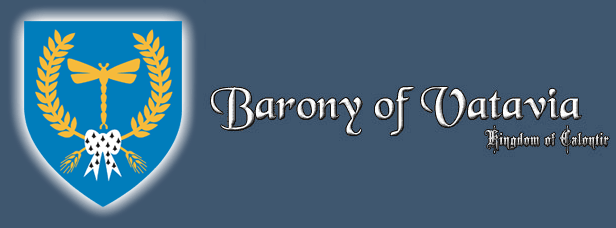
Medieval Vocabulary I
by Friar Thomas Bacon (David Moreno)
Orignally published in the March 2000, A.S. XXXIV issue of the Dragonflyre, a publication of the Barony of Vatavia.
As a follow up to last month’s article, this month I’ll present a list of words in use during the period, but have since fallen out of use. The criteria I used were words that could be used in ordinary conversation and are not technical jargon, or otherwise had already found their way into Societal use. Also included are words that have a different meaning today then they had then. The dates are of the first citation in the Oxford English Dictionary.
Abear (885): Tolerate or Endure. This was used in lieu of ‘bear’, which also has the meaning: to carry.
Bever (1451): A drink between meals.
Bode (888): A messenger or herald. Could also mean a message or command. When used as a verb it means ‘to proclaim or preach’.
Char (1325): A single act of work. This survives today in charwoman, who is hired only for the job at hand. A variant is ‘chares’ which means: a day’s work. Which today is the word ‘chore’.
Clout (1225): To patch or mend. It could also mean the piece of cloth used to make the patch. The term ‘clout shoot’ first appears in 1584.
Cod (1000): Pillow, bag, or cushion. It could also be used as a suffix to indicate what it normally held. Thus a peascod is a bag to hold peas.
Dow (1000): To be able, prosper. The more correct ending for the greeting: How do you do?
Dudgeon (1380): The box wood handle of a knife or dagger, or the wood itself.
Feudalism: The political system in vogue between the 9th and 15th centuries. Not an actual period word, it was coined in 1839 to distinguish it from other political systems. The political theorists of the period had no concept of vastly different systems so had no need for such a word. It comes from the Latin word ‘feudum' which means reward, which usually was a piece of land or fief.
Forefighter: Champion. Anglo-Saxon, it literally means the fighter in front.
Gale (1200): A voice or sound; or to sound or sing. Thus ‘nightingale’ literally means ‘song of the night’, while a madrigal is the ‘voice of the mother’. The latter was because they were to be sung without accompaniment. Its use to refer to a storm does not occur until 1547.
Glaver (1380): To flatter, leer, or ogle.
Here (855): Anglo-Saxon word for army. Usually applied to the Danish invaders.
Kilt (1340): To lift up petticoats to avoid they dragging. The Gaelic name for that piece of Scottish cloth is ‘feileadth-beag’ which means ‘little plaid’. This sense of the word was not used until 1730.
Kith or Kithe (900): To show or to make known. The word ‘couth’ has the same origins and originally the same meaning. Today the words have evolved so that couth means ‘knowledgeable’ particularly of manners, while kith means acquaintances or known people who other then relatives.
Math (963): A mowing. Thus ‘aftermath’ originally meant the pasture after it had been mowed. It also referred to the second cutting of grass.
Matter (1330): Subject or theme of a tale or discourse. The matter of England is the story of King Arthur. The matter of France is about Charlemagne.
Meal (897): A time or a mark. As originally applied it meant the fixed time of eating. The word for the food has a different derivation. This meaning also survives in the word ‘piecemeal’, which means a piece at a time.
Meare or Mere (825): A boundary. Often used a prefix to indicate the item so attached marks a boundary.
Merle (1483): A blackbird. Used mostly in Scottish poetry.
Monger (975): A retail dealer. While originally applied to anyone sells physical goods, it has broadened to include anyone who traffics in anything. It is often used a suffix to what the person deals in. Thus a cheesemonger is a cheese dealer.
Nay (1175): No. There is a subtle difference between the two words. No is preemptive and final. Nay is an objection or a negative opinion that could be reversed.
Prank (1546): To dress in fashion. This word was usually used as a depreciative remark.
Rape (1300): Haste. A related word ‘rapen’ means to make ready or prepare.
Rote (1315): Custom or habit, routine. This word is employed as a metaphor to indicate something is done mechanically like a wheel that turns around and around.
Shaw (755): A small wood or thicket. Usually on the boundaries of fields.
Sooth (950): Truth or genuine. In Society usage the prefix ‘for’ is added and used to mean ‘correctly’. The prefix was often used on many words to accentuate that word’s meaning. Thus ‘forsoothly’ literally means strong resemblance of truth.
Stithy (1295): An anvil. By 1602 the word also could be used to mean a forge or smithy.
Swink (517): To labor over hard. To wear one out with labor is to be forswink with the past participle being foreswunk.
Thews (893): Culture or manners.
Tickle (1325): Dangerous or difficult. Hence 'a ticklish question’.
Bibliography
Brown, Lesley, ed. The New Shorter Oxford English Dictionary. Oxford: Clarendon Press, 1993.
Mackay, LL.D., Charles. Lost Beauties of the English Language. London: Bibliophile Books, 1987.
Morris, William, ed. The American Heritage Dictionary of the English Language. New York: Houghton Mifflin Co., 1973.
Murray, James et. al., ed. The Oxford English Dictionary. Oxford: Clarendon Press, 1978.
Copyright © 1997 - present His Lordship Friar Thomas Bacon (David Moreno). All rights reserved.